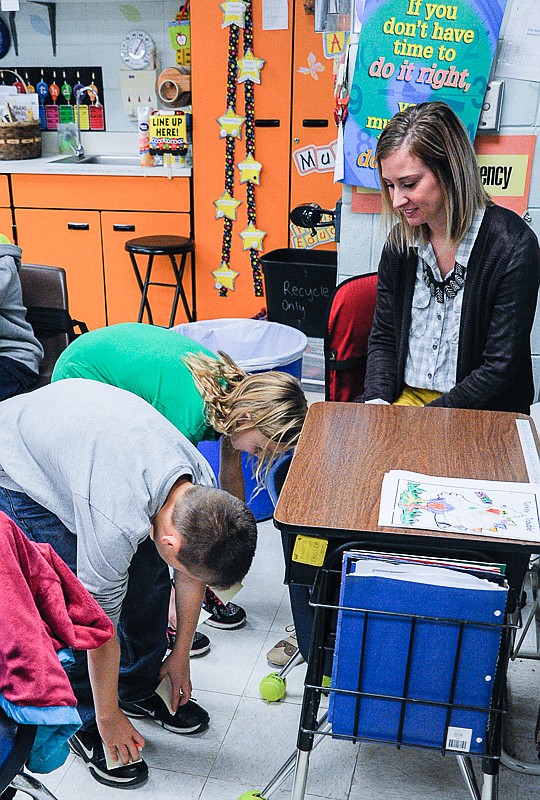Area public schools open their classrooms to student teachers from nearby colleges, most semesters. The arrangements are mutually beneficial.
At Russellville Elementary and Middle schools this fall, two Lincoln University students have been developing their lesson planning and delivery skills in the fourth grade and middle school math classes.
In exchange, the host teachers have learned some new techniques and technology, as well as having extra time for their own professional development.
The students also benefit from having a second teacher in the classroom.
"She makes everything fun," fourth grader Hallee Stewart said of having Hannah Wilson as student teacher in Cindy Wieberg's class. "She brings in things, you never know what's in her bag."
Bringing in colored popcorn and her pet turtle are some of the ways Wilson has enhanced the classroom this semester. She also brings with her a certification in eMINTS (enhancing Missouri's Instructional Networked Teaching Strategies).
The four-class area of concentration teaches future teachers how to incorporate SmartBoards, digital photography, website development and other technology-based tools into daily lessons, said Sam Schnieders, an associate professor at Lincoln and Wilson's supervising teacher.
"It gives them more tools to work with," Schnieders said.
Lincoln was the first higher education institution to offer eMINTS certification. Since 2002, an average of one-fourth of education students at Lincoln have completed the eMINTS certification, he said.
Even if she does not teach at an eMINTS school, typically grades 3-5 in low income schools, the background will help, she said. And the certification looks good on a resume, Schnieders added.
Although Wilson admits she enjoys the paper-and-pencil method better, "we know this is how kids learn best," she said. "It's not about me and my learning. It's that we know they are learning."
At the same time, Wilson is still a student.
"I'm here to teach kids, but when I leave at the end of the day, I think about what they have taught me," she said.
Wilson said she feels the Lincoln education program prepared her for her first classroom experience through its down-to-earth approach and small class sizes.
However, some things, like discipline, can't be learned until one experiences it, Wilson said.
On the other hand, the classroom teachers like Wieberg who have been at this for many years benefit from the new ideas and programs student teachers like Wilson bring with them.
For example, Russellville elementary adopted the Lucy Caulkins writing curriculum this school year. It was already in place in the Jefferson City Public Schools, where Wilson did some observations, so she came in with a familiarity.
"She's been a wonderful asset to implement this program; she even did the kick-off for us in August," Wieberg said.
Wilson also has helped bring in fresh strategies for the school's Response to Intervention program, which works with struggling students, Wieberg said.
And with Wilson handling the classroom, Wieberg has been able to observe her neighbor classrooms for further collaboration.
Similarly, middle school math teacher Stacie Strobel has been able to observe the first-year teacher she is mentoring, having Jessi Nivens as a student teacher.
Nivens, also a Lincoln student, has been helpful in the math classroom, not only teaching the lessons but providing a second teacher for immediate feedback to help student learning.
"I'm pretty excited to be teaching middle school math," Nivens said. "I've felt very comfortable here; I'm very thankful."

